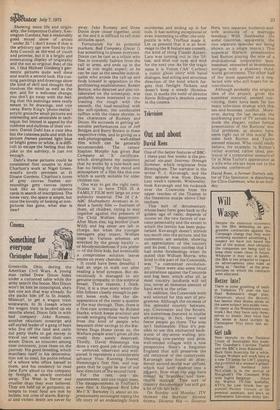Television
Out and about
David Rees
One of the better features of BBC1 these past few weeks is the projected six-part Journey through Summer, which originates from Birmingham. The narrator is the writer P. J. Kavanagh, and the first episode was from Devon. Last week's episode, Wednesday, took Kavanagh and his rucksack over the Cotswolds from the upper reaches of the Thames to the limestone scarps above Cheltenham.
This sort of documentary, whose basic form goes back to the golden age of radio, depends of course on the two factors of narrator personality and the extent to which the terrain has been popularised. Kavanagh doesn't intrude too much into the picture, and his comments are sensible, showing an appreciation of the country and its past. I must confess that I had some forebodings when he stated that William Morris, who lived in this part of the Cotswolds, was "a committed revolutionary." There were also some ritual incantations against the Concorde and keg beer, which after all, as most country landlords will tell you, saves an immense amount of hard work in the cellar.
In addition, the Cotswolds were well selected for this sort of programme. Although the recesses of this splendid country between, say, Cirencester and the Severn, are sometimes featured in tourist advertising, in fact, fewer and fewer people go there. The area isn't fashionable. Thus it's possible to see this enchanted backwater of dry-stone walling, proliferating cow-parsley and prim, well-tended villages with a new perspective. Here's a forgotten England that still preserves the old reticence of the countryside. Kavanagh also found an abandoned second world war airfield, which had later evolved into a piggery. Now even the pigs have moved as brambles and hawthorns multiply. This sort of country documentary has still got a lot of life left in it.
On Sunday and Monday, ITV showed the Burtons' divorce drama, Divorce His — Divorce Hers, two separate husband-andwife accounts of a marriage breakup. With flashbacks. (In some countries, apparently, the two separate episodes are being shown as a single movie.) This superstar Harlech presentation had Burton playing the role of a, multinational corporation businessman, enmeshed in boardroom intrigue with a shadowy thirdworld government. The other half of the team appeared as a neglected wife who still hopes for reconciliation.
Although probably the original idea of the project, given the superstar material, seemed convincing, there have been far too many television dramas with this sex-and-business conflict. Moreover, during the last decade, the quickening pace of TV serials has made the elegant, rather formal presentation of the Burtons' marital problems, as shown here, seem right out of this world. Besides both Burton and Taylor seemed miscast. Who could really believe, for example, in Burton's rather worried, rather tired, portrayal of a corporation executive? Or in Miss Taylor's appearance as a wife who always loses out to the business conference?
David Rees, a former literary editor of The Spectator, is deputising for Clive Gammon, who is on holiday












































 Previous page
Previous page